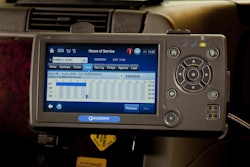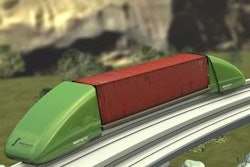Keep your debt low and your credit rating high to land a loan with good terms.
Financing a truck can be frustrating, confusing and time-consuming, especially for first-time buyers. It also can be costly if you are not prepared. Give yourself plenty of time to shop for a truck and for favorable financing.
 When buying a truck under warranty, find out whether warranty work can be done at any authorized shop in the nation and whether the warranty covers labor, parts, towing, down time and a replacement vehicle.
When buying a truck under warranty, find out whether warranty work can be done at any authorized shop in the nation and whether the warranty covers labor, parts, towing, down time and a replacement vehicle.The good news is that truck loans, like business loans from a bank, usually have much lower rates than credit cards. Loans for trucks and other secured loans, such as cars or houses, are lowest because assets are backing them up. A bank’s business loan often is around 1 percent a month (12 percent annually). That’s where the best credit card rates start, but they’re usually much higher, even 20 percent or more for owner-operators with bad credit ratings.
Get a copy of your credit report before you attempt to secure equipment financing. Your credit history could contain wrong or harmful information that you’ll want to explain to a potential lender. Always be up-front about your problems. Showing you have overcome hard times demonstrates determination and strong character. When you apply for a loan, be prepared to provide as much information as you can. The more you tell a potential lender about yourself and your operation, the more comfortable he will be lending you the money. Show the lender you are a business owner first and a truck operator second.

FINANCING SOURCES
Banks are not your only option for borrowing money. Check around for the lender that best suits your needs.
BANKS. Banks are reluctant to lend money for an over-the-road truck. In their opinion, “rolling collateral” is not a good risk. If you’ve been doing business at the same bank for a long time, however, and have an established relationship with a loan officer, it’s worth a try if your credit is good.
CAPTIVE LENDING INSTITUTIONS. These finance companies are owned by equipment manufacturers. They often are more willing than banks to lend money to new owner-operators because they are in the business of selling trucks. A used truck dealer might refer you to lenders other than captive finance arms.
COMMERCIAL LENDING INSTITUTIONS. These finance companies are not necessarily affiliated with truck manufacturers, but certain ones cater to the trucking industry.
GETTING THE MONEY
Whatever type of financing you choose, keep in mind that truck loan interest costs easily can consume up to 4 percent of your gross revenue. Interest rates can vary by two or three percentage points, even more – a difference of as much as thousands of dollars in interest over the life of a loan.
No matter where you obtain financing, the following can affect your interest rate:
• Credit history. People who have good credit get the lowest interest rates.
• Stable job history. Job-hopping indicates a lack of responsibility and rings the alarm for a lender.
• Longtime residency. People who live at the same address for a long time usually have a better credit rating.
Don’t take the first financing option you’re offered. You can negotiate loan rates just as you can haggle over the price of a truck. Interest rates vary from lender to lender, and from one part of the country to another, and finance managers have some leeway when setting the rate for your transaction.
NEGOTIATING THE DEAL
Getting a serviceable truck at the lowest payment possible is your goal. Before you head to the bargaining table, however, know how much you want to pay for a truck, how much you can manage per month and what interest rate you want. Then negotiate with what you consider to be the top three dealers. Never settle for the first quote. In many cases, you can work with a reputable dealer and bring down the price of your new rig through negotiation or, with a used truck, specification changes.
If you’re buying a new truck, before negotiations begin ask each dealer to provide a complete breakdown of the vehicle price, showing the list price for the chassis and every spec option, applicable taxes, transportation and dealer prep costs. Ask about dealer add-ons, such as delivery charges and predelivery services, that could crop up after you cut the deal. Make sure your down payment or trade-in is included in the order.
Also, be sure your dealership is able to service your vehicle and that warranty work and downtime will have the least possible effect on your driving time and miles. Get warranty agreements in writing and make sure you fully understand them. Ask how warranty work is reimbursed.
BEFORE YOU SIGN
Get full disclosure before you sign a finance contract. Make sure the total price is clearly defined. Truth-in-lending laws do not apply to commercial loans, such as truck financing, so dealers do not have to give full disclosure, but most will if they are asked.
In addition:
• Don’t sign anything you don’t understand.
• Get a copy of everything you sign.
• When trading, don’t sign over the title of your truck until you take delivery of the truck you’re buying.
• Don’t sign a finance contract until you have a ready source of revenue. Make sure you can put your truck to work within a few days of leaving the lot.
• Don’t automatically include insurance in the final contract. Shop around beforehand, and you might opt to buy it elsewhere.
• Don’t sign up automatically for credit life or credit disability insurance, which covers your truck payments if you die or become disabled. You likely can get the same type of policy on your own at a much lower rate.
• Make sure all requested repairs are completed to your satisfaction.
SHORTER LOAN, CHEAPER TRUCK
The ideal loan term for a three-year depreciable asset like a heavy-duty truck is three or four years, during which you can reap the tax benefits of depreciation to maximize the affordability of the monthly payments.
New truck: $118,000 at 7.5%
Loan term length/years 3 4 5 6
Monthly payment $3,120 $2,425 $2,010 $1,734
TOTAL VEHICLE COST $130,018 $134,107 $138,289 $142,562
CARRIERS WITH LEASE PURCHASE PLAN
Lease-purchase plans are popular paths to truck ownership, particularly among operators with otherwise shaky credit, but some carrier contracts make it difficult to generate enough revenue to meet payments. Appealing to nascent operators who have few financial resources or less-than-sterling credit histories, the contracts may require high weekly payments, maintenance accounts or end-of-lease balloon payments.
They generate the most controversy for practices that favor the company at the expense of the owner-operator. Common complaints include mileage manipulation in the latter stage of the contract and unadvertised fees and charges.
But another approach practiced by some carriers is centered around developing an owner-operator base and helping contractors develop their businesses. Do diligent research on the carrier and analyze the lease carefully.
If you have questions after reading the contract, consider hiring a lawyer or financial adviser to review it. Make sure items such as down payment, weekly or monthly payments, maintenance escrow account, length of contract and what you’ll owe at the end of the agreement are spelled out.
Work up a budget to give you an idea of what truck payments you can afford and how much revenue you’ll need to cover payments and other financial obligations. Given the age of the truck, estimate what it will be worth when you complete the contract. Many carriers offer no-money-down contracts, but this often means higher periodic payments. Weekly payments of $400 to $600 aren’t uncommon.













